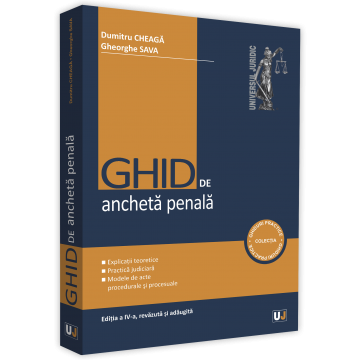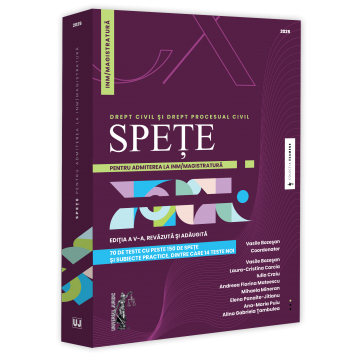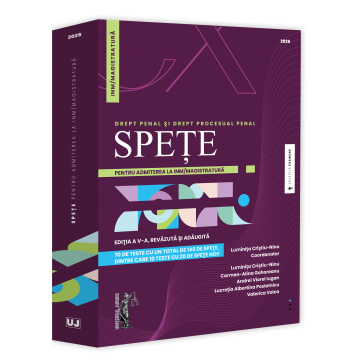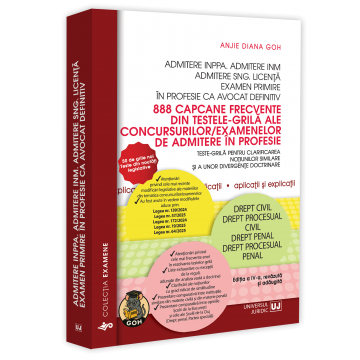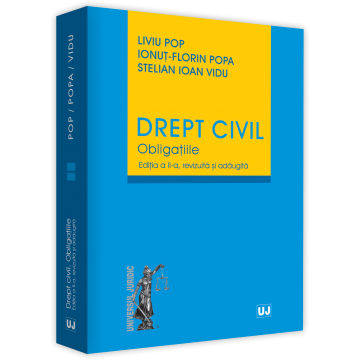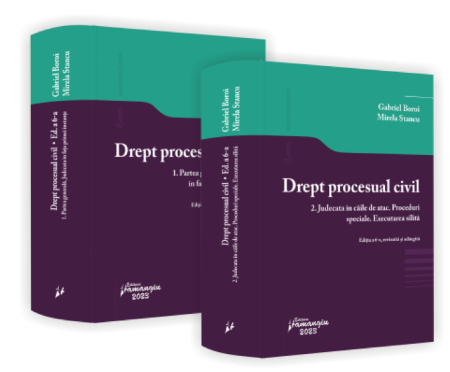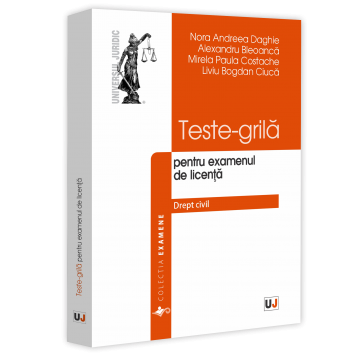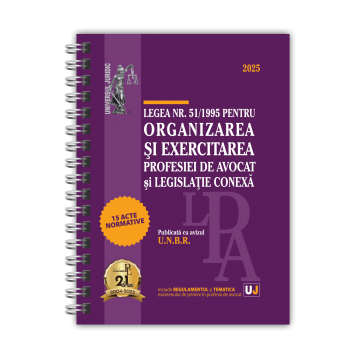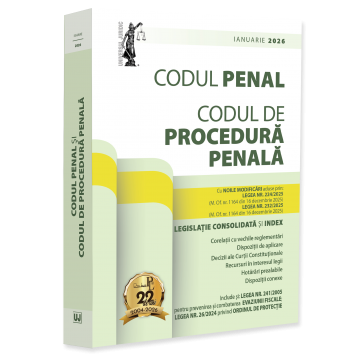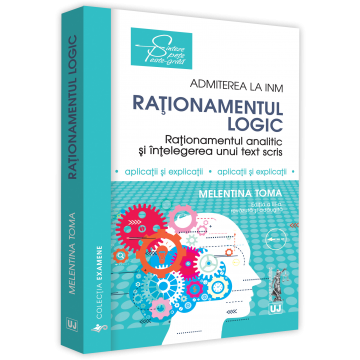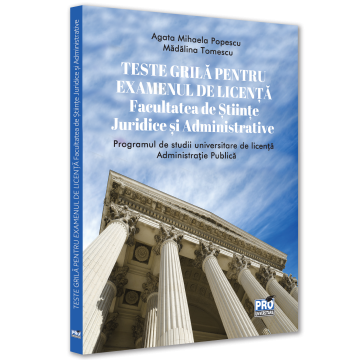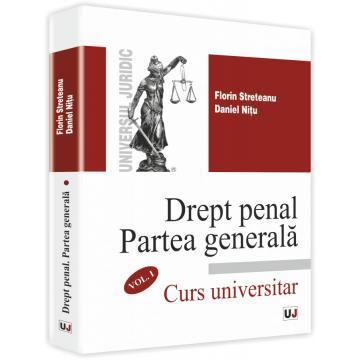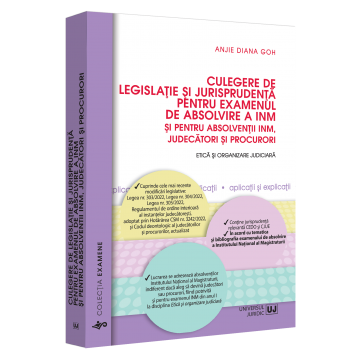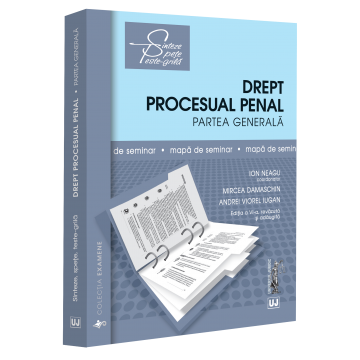6359.png) The administrative-jurisdictional complaint formulated by the persons deprived of liberty under the Law no. 254/2013 regarding the execution of punishments and custodial measures ordered by the judici
The administrative-jurisdictional complaint formulated by the persons deprived of liberty under the Law no. 254/2013 regarding the execution of punishments and custodial measures ordered by the judici
6359.png)
ISBN: 978-606-28-1460-1
DOI: https://doi.org/10.5682/9786062814601
Publisher year: 2022
Edition: I
Pages: 306
Publisher: Editura Universitară
Author: Simona Nedelcu
- Description
- Download (1)
- Authors
- Content
- More details
- Reviews (0)
This paper is a novelty, which consists in addressing a niche field of criminal enforcement law, being an examination of the practical possibilities by which persons deprived of liberty dissatisfied with the way their requests are resolved, or the fact that their rights have been violated, they can resort to this legal instrument in order to have their requests analyzed by an independent body, namely the judge supervising the deprivation of liberty. Also, the paper addresses and offers solutions, through proposals of law ferenda, to eliminate the legislative inconsistencies found between the normative acts that regulate the execution of sentences and custodial measures, but also to solve some situations that the legislator did not regulate by Law no. 254/2013 for the execution of sentences and measures of deprivation of liberty, such as the abuse of rights committed by persons deprived of liberty, by formulating repetitive complaints, without purpose or by using language that denigrates, offends, harasses, establishes risk and of the degrees of risk, of the risk of recurrence, etc.
Through the ways of approaching, structuring ideas, concepts, the paper is a useful tool for students, practitioners, but also for those interested in the legal defense of persons deprived of liberty of rights and interests during the execution of sentences and measures of deprivation of liberty.
Author
-
The administrative-jurisdictional complaint formulated by the persons deprived of liberty under the Law no. 254/2013 regarding the execution of punishments and custodial measures ordered by the judici
Download
Chapter 1. Social and legal aspects of the execution of sentences and educational measures depriving of liberty / 13
Section 1 a. Legal status of the person deprived of liberty and liberties / 13
§1. The notion of legal status of the citizen / 13
§2. European recommendations for citizens / 15
§3. Limitation of the legal status of citizen as a result of the execution of criminal sanctions / 18
§4. Guarantees in the system of application of custodial sanctions / 20
§5. Limitations imposed by the Constitution and the court / 25
§6. Subsequent limitations imposed by Law no. 254/2013 on the execution of sentences and custodial measures ordered by the judiciary during criminal proceedings / 32
a) Freedom of movement / 33
b) Restrictions on individual rights and freedoms / 34
c) Restrictions on private and family relations / 37
Chapter 2. Administrative ‑ jurisdictional complaint - institution specific to the execution of sentences and custodial measures / 47
Section 1. The right to petition persons deprived of their liberty and the principle of free access to justice / 47
Section 2 a. Understanding and defining the concept of administrative ‑ jurisdictional complaint / 54
Section 3 a. The right of the person deprived of liberty to file complaints, in order to defend their rights and interests / 69
§1. Complaint of persons deprived of their liberty as an independent legal instrument / 69
§2. Administrative complaint, as a guarantee of the principle of free access to justice / 70
Section 3 a. The meanings and characters of the jurisdictional administrative complaint / 72
Section 4 a. Jurisdictional administrative complaint and other means of notification. Similarities and differences / 75
Section 5 a. Complaints mechanism. Basic principles / 80
§1. The purpose of the complaint / 80
§2. International procedures for the preparation and filing of complaints by persons deprived of their liberty / 83
§3. National procedure for the submission of requests and complaints by persons deprived of their liberty / 87
Section 6 a. Abusive exercise of the right to petition / 90
§1. At the level of the courts / 93
§2. At the level of the Surveillance Judges' Offices / 95
Section 7 a. Conditions for the admissibility of jurisdictional administrative complaints / 103
§1. Procedural conditions / 104
1.1. Written form / 104
1.2. The complaint must contain the identification data / 105
1.3. Holder of the complaint / 105
1.4. The complaint must be signed by the petitioner or agent / 107
1.5. Deadline for filing a complaint / 107
§2. Background conditions / 110
2.1. Jurisdiction of the judge supervising deprivation of liberty / 110
Chapter 3 Theoretical and practical aspects with an impact on the execution of sentences and custodial measures / 117
Section 1. Establishment and change of the regime of execution of the sentence and of the educational measures deprivation of liberty / 117
§1. The penitentiary regime / 117
§2. The regime of execution of the sentence and of the educational measure depriving of liberty / 120
§3. Criteria for evaluating the individual situation in order to establish or change the execution regime. Theoretical and practical exam / 122
Section 2 a. Legislative inconsistencies between law 254/2013 on the execution of sentences and custodial measures and other normative acts, which generate difficulties in the interpretation and application of the law when establishing and modifying the execution regime / 137
I. Issuance of a new warrant for the execution of the sentence as a result of merging sentences, appeals against execution, with the consequence of canceling the old warrant and issuing a new warrant corresponding to the new resulting sentence / 139
II. The situation of the "pending warrant": the issuance of a new warrant as a result of the execution of another / other custodial sentences that the detainee did not merge with the one in the execution of which he is / 147
Section 3 a. Inclusion in the degree of risk and the remedy provided by law against the classification of the detainee in the category of those who present a risk for the safety of the penitentiary / 153
§1. The risk to the security of the penitentiary / 153
§2. Legal relevance of the risk for the institution of the enforcement regime / 154
§3. The issue of risk factors and their dynamic interpretation in practice / 158
3.1. Aggressive behavior / 158
3.2. Self-aggressive behavior / 167
3.3. Conclusions / 168
§4. The nature of the administrative ‑ jurisdictional complaint against the decision to establish, maintain or terminate measures specific to the risk to the security of the penitentiary / 173
Section 4 a. Legal effects of limiting the exercise of the rights of persons deprived of liberty by non-compliance with legal provisions / 194
Section 5 a. Disciplinary practice in the application of Sanctions / 214
§1. The notion of penitentiary discipline / 214
§2. Sources of penitentiary discipline / 215
§3. Ways of carrying out the penitentiary discipline / 217
§4. Disciplinary liability of persons deprived of their liberty ‑ form of legal liability specific to criminal enforcement law / 219
§5. Disciplinary sanction / 223
§6. Individualization of the disciplinary sanction / 224
§7. Proportionality between the disciplinary sanction and the gravity of the committed offense / 227
Section 6 a. Territorial competence of the disciplinary commission and its successive effects, in relation to the competence of the supervising judge and of the court invested with the settlement of the appeal / 231
Section 7 a. The limitation period of the finding of the facts that may meet the elements of some disciplinary offenses / 245
§1. The nature of the limitation period / 245
§2. Appeals against the decision of the disciplinary commission / 248
§3. The influence of the disciplinary situation on other institutions of criminal enforcement law / 249
3.1. On parole / 249
3.2. On the right to work / 252
§4. Exempt cases of disciplinary liability / 253
§5. Objectives and measures in the application of the disciplinary system / 256
Chapter 4. Conclusion of the supervising judge / 262
Section 1. The legal nature of the conclusion of the supervising judge / 262
Section 2 a. Standards regarding the conclusion of the supervisory judge / 265
§1. The quality of the supervisory judge's conclusions / 265
1.1. The quality of the decision - making process / 266
1.2. Criteria related to the conclusion elaboration process. The quality of the motivation of the conclusion of the Supervising Judge / 268
Section 3 a. Appeal against the conclusion of the Supervising Judge / 272
§1. Appeal as a mechanism for protecting the interests of persons deprived of liberty / 272
§2. Submission of appeals to the competent court / 272
§3. Settlement of appeals / 275
Conclusions and proposals of the ferenda law / 280
Bibliography / 290
I would also like to thank the distinguished members of the public support committee composed of professors Ioan Chis, Bogdan Micu, Mihai Adrian Hotca, from the "Nicolae Titulescu" University of Bucharest, and the referents, professors Ion Rusu from the Faculty of Law. from Danubius University Galati and Ioan Durnescu from the Faculty of Sociology within the University of Bucharest, to all for their appreciation and proposals for awarding this doctoral thesis the grade Very good.
The motivation for choosing this topic was that the legal instrument specific to criminal enforcement law, made available to persons deprived of liberty, namely the administrative ‑ jurisdictional complaint, has never been the subject of any specific analysis, in terms of understanding the concept, national and international mechanisms. submission of these complaints, the purpose of these complaints, the institutions before which they are submitted, the manner of settlement, etc.
The novelty of the monograph consists in the fact that it is a niche work, representing a practical examination of the possibility by which persons deprived of liberty dissatisfied with the way their requests are resolved, or the fact that their rights have been violated, can call at this institution of criminal enforcement law through which an independent body, namely the judge supervising the deprivation of liberty, analyzes and solves their requests. Also, the paper approaches and offers solutions, proposals of law ferenda, for the legislative inconsistencies found between the normative acts that regulate the execution of punishments and custodial measures, but also for the situations that the legislator did not regulate by Law no.254 / 2013 , such as the abuse of rights committed by persons deprived of liberty, by formulating repetitive complaints, without purpose or by using derogatory, offensive, vexatious language, establishing the risk and degrees of risk, the risk of recidivism, etc. .
I consider that through the ways of approaching, structuring ideas, concepts, the paper is a useful tool for students, masters, practitioners interested in criminal enforcement law, the legal way to defend by persons deprived of liberty their rights and interests during execution punishments and custodial measures.
Author

![The administrative-jurisdictional complaint formulated by the persons deprived of liberty under the Law no. 254/2013 regarding the execution of punishments and custodial measures ordered by the judici [1] The administrative-jurisdictional complaint formulated by the persons deprived of liberty under the Law no. 254/2013 regarding the execution of punishments and custodial measures ordered by the judici [1]](https://gomagcdn.ro/domains/editurauniversitara.ro/files/product/large/619744.jpg)
